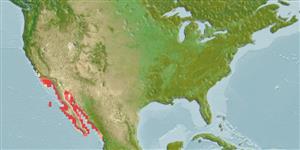Teleostei (teleosts) >
Eupercaria/misc (Various families in series Eupercaria) >
Sciaenidae (Drums or croakers)
Etymology: Umbrina: Latin, umbra, -ae = shadow, in the sense of phantom; due to its quick movements (Ref. 45335).
More on authors: Jordan & Gilbert.
Environment: milieu / climate zone / depth range / distribution range
Ecology
Marine; demersal; depth range 10 - 60 m (Ref. 91172). Subtropical; 37°N - 22°N, 123°W - 104°W
Eastern Central Pacific: Point Conception in California, USA to the Gulf of California; old records from as far north as San Francisco, California.
Size / Weight / Age
Maturity: Lm ? range ? - ? cm
Max length : 56.0 cm TL male/unsexed; (Ref. 40637); max. published weight: 2.5 kg (Ref. 40637)
Found in shallow sandy areas, often in surf zones, bays and tidal sloughs. Feed on fishes, crustaceans, marine worms and bivalves (Ref. 9118) Often caught by surf fishers. Pelagic spawners (Ref. 56049).
Life cycle and mating behavior
Maturity | Reproduction | Spawning | Eggs | Fecundity | Larvae
Oviparous (Ref. 240). Pelagic spawner (Ref. 56049).
Eschmeyer, W.N., E.S. Herald and H. Hammann, 1983. A field guide to Pacific coast fishes of North America. Boston (MA, USA): Houghton Mifflin Company. xii+336 p. (Ref. 2850)
IUCN Red List Status (Ref. 130435: Version 2024-2)
Threat to humans
Harmless
Human uses
Fisheries: commercial; gamefish: yes
Tools
Special reports
Download XML
Internet sources
Estimates based on models
Preferred temperature (Ref.
123201): 19.5 - 25.9, mean 22.4 °C (based on 22 cells).
Phylogenetic diversity index (Ref.
82804): PD
50 = 0.5000 [Uniqueness, from 0.5 = low to 2.0 = high].
Bayesian length-weight: a=0.00794 (0.00492 - 0.01282), b=3.06 (2.92 - 3.20), in cm total length, based on LWR estimates for this species & Genus-body shape (Ref.
93245).
Trophic level (Ref.
69278): 3.5 ±0.47 se; based on food items.
Generation time: 4.1 ( na - na) years. Estimated as median ln(3)/K based on 2
growth studies.
Resilience (Ref.
120179): Medium, minimum population doubling time 1.4 - 4.4 years (Preliminary K or Fecundity.).
Fishing Vulnerability (Ref.
59153): Moderate vulnerability (36 of 100).
